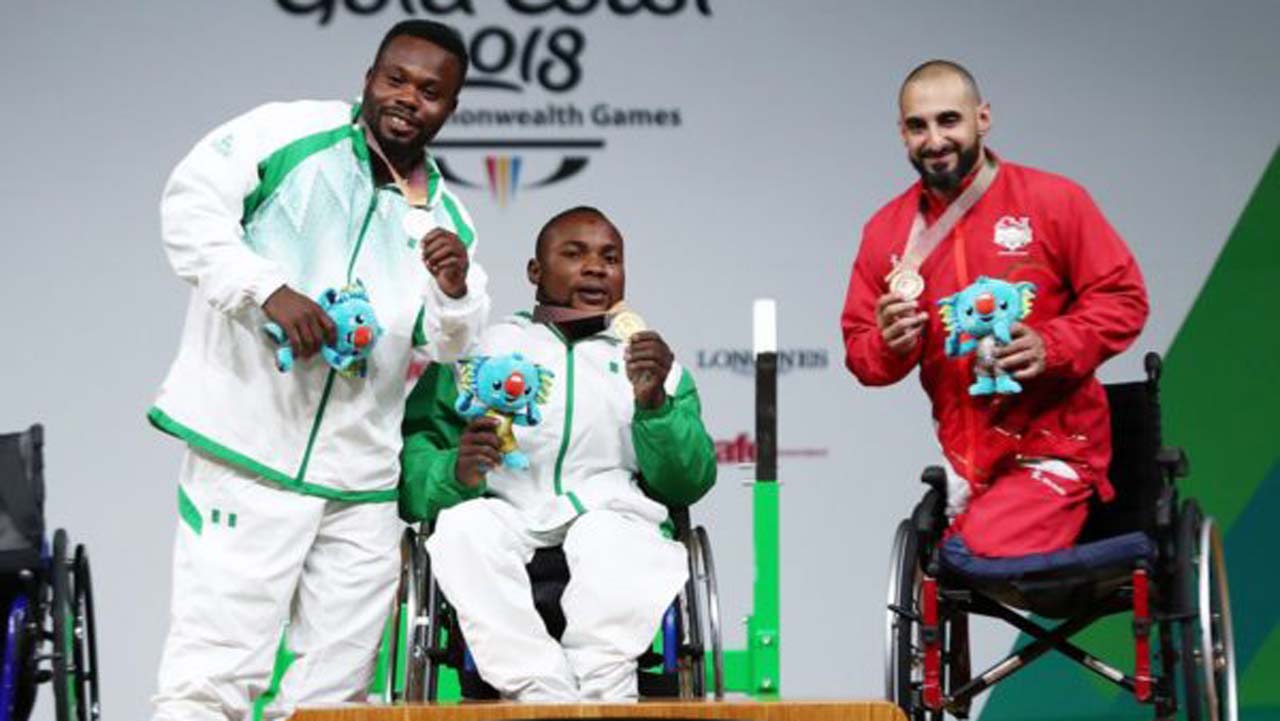This is one of those weeks for me. There is little happening around of great interest in our domestic sport. So, I spend more time groping in the dark for what to write in order to fill this page with literature that readers want to read.
So, I settle for what has just concluded in the Gold Coast of Australia where the national anthem of Nigeria was blared so few times I can only really recall when female Nigerian sprints hurdler, Omotolani Amusan, was being decorated with the best Gold medal the country got out of the just concluded Commonwealth Games.
Overall, Nigeria came away with 29 Gold, Silver and Bronze medals, a few medals short of the haul in Glasgow four years ago when the country ended up with 35.
The ‘good’ news as announced by the Honourable Minister of Sports, Solomon Dalung, who led the Nigerian government delegation to the games, is that on the basis of ratio of athletes that attended to number of medals won, the Gold Coast was a better fishing ground than Glasgow in 2014.
With my humble pedigree in sport, I cannot even politely address that conclusion, knowing well that of the nine Gold medals won, only one came from Track and Field and three from Wrestling. The other five Gold medals were won by Paralympic power lifters, athletes in sports for athletes that are physically challenged.
Lumping all the medals together to look respectable on the finals medal table is the worst way to measure the level of sports development in a country. A medal is not any medal.
Add to this flattering assessment the conduct of a few Nigerian athletes that joined athletes from some African countries to abscond from their teams, to escape temporarily from the long arms of Australian immigration officials, and to become asylum seekers and fugitives in a foreign land more for economic reasons than for sport.
This is the worst kind of advertisement for a developing country, and a sad commentary on the social, economic and political state of Nigeria.
Unfortunately, this is not new. During the Sydney Olympics in 2000, many athletes also ‘disappeared’ into Australia, lost to sport and to Nigeria forever. They have been living since then in the obscurity of one of the farthest places from home on the planet.
Australia is so far from home that even when I had an opportunity to visit the country some years ago, a country considered one of the most welcome places in the world, I refused to embark on the endless flight across the Pacific Ocean.
Australia is an attractive destination for economic refugees only because the process of transforming from fugitive to refugee and finally to settler is not as bruising as it is in Europe or the United States of America.
We were told before the Games that, following the experiences in Sydney, measures had been taken to ensure such defections did not repeat themselves again. Now this.
Some people should be held accountable and responsible for this ugly and degrading practice that has consequences far beyond the Games. Innocent citizens seeking legitimate visas to visit the country would suffer poor, humiliating treatment and embarrassment at the hands of visa officers in the affected embassies.
This is a huge psychological blow to the most populous Black nation on earth that is fighting to rise above its poor image as a struggling Third World State.
That’s why even sports teams intending to go for training and competitions in even small and inconsequential countries are often denied visas.
The Nigerian sports authorities must find effective ways to tackle this shameful and harmful practice.
That would require treating our athletes at home with more respect, paying them well, providing better facilities for their training and competitions, putting in place a good welfare package as incentive for them to represent the country proudly and return to make contributions to national development. Nigerian athletes should be so proud and comfortable in Nigeria that going abroad would not be their first and only option.
It can be done.
What is needed is a kind of leadership in sports with a clear vision and mission, that will aim for Space and not the low ‘clouds’ of celebrating the achievements of physically challenged athletes and claiming them as country’s advancement in sport.
Nigeria’s Paralympic athletes were once again magnificent in their performance. Their medal haul is a major factor in the country’s final placement in ninth position on the overall medals table.
They should be celebrated and compensated even as we must examine our declining status as a sports power in the Commonwealth of Nations.
When coming second is better than winning
Until the night of April 16, 2018, she was a nobody. Suddenly, like a bolt from the sky, Sarah Sellers emerged from nowhere and became a star, attracting considerable global media attention, including the world’s news leader, CNN, that made her story headline news for two whole days.
Her climb from obscurity to limelight is a fairy tale.
Sarah emerged surprise winner of the $75,000 US Dollars prize money for the runner-up in one of the world’s prestigious marathon races, the 26.2 miles Boston Marathon that suffered but has fully recovered from a terrorist bomb blast a few years ago.
Before that night, Sarah was an ordinary nurse anesthetist in a hospital in Arizona, USA. 26 and married, all her experiences at this level of athletics was one previous marathon race where she finished unnoticed.
On the night of April 16, in a blistering weather of gusty winds and pouring rain, her personal ambition was to complete the race and be counted amongst the top 20 runners in the elite class of runners from the sea of runners that take part in the annual festival of sport.
When she came to the finish line after over two hours of a grueling race in the worst kind of weather, she asked casually how far back she was from the winner and received the shock but best response of her life – she was second.
It has been five days since the event but Sarah’s life has not been the same ever since. She has risen from the being a mere statistic to being a star with a possible new career in marathon racing.
She is already contemplating competing at the next Olympics in Tokyo and is willing to put in the hours and hard work needed to maintain her new-found status.
Once again, the world is witnessing the beauty and the transformative power of sports. Congratulations to Sarah Sellers, a new name to watch out for in marathon running.
Winner with an unusual heart
Incidentally, Desiree Linden won the 2018 Boston Marathon race. She too is being celebrated, but more for a benevolent act during the race than for winning the race itself.
During the race, her team mate and running partner, Shalane Flanegan, winner of the New York Marathon a few months ago, and one of the favourites to win the Boston Marathon, was pressed by pressed and needed to use the bathroom.
Whilst Shalane briefly stopped to answer the call of nature in one of the toilets along the route, Desiree did the most unusual act of team spirit that captured the imagination of the viewing world. She deliberately slowed down her running, stalling for her partner to catch up with her, so as not to lose touch with the leading group of runners.
That was almost blowing her own chances in order to support a teammate.
Although, Shalane Flanegan rejoined the race she never quite made it back to the front group. Desiree ran well and went on to win with a clear four minutes 10 seconds’ gap between her and Sarah Sellers.
Another great story in the annals of sports.
(GUARDIAN)





